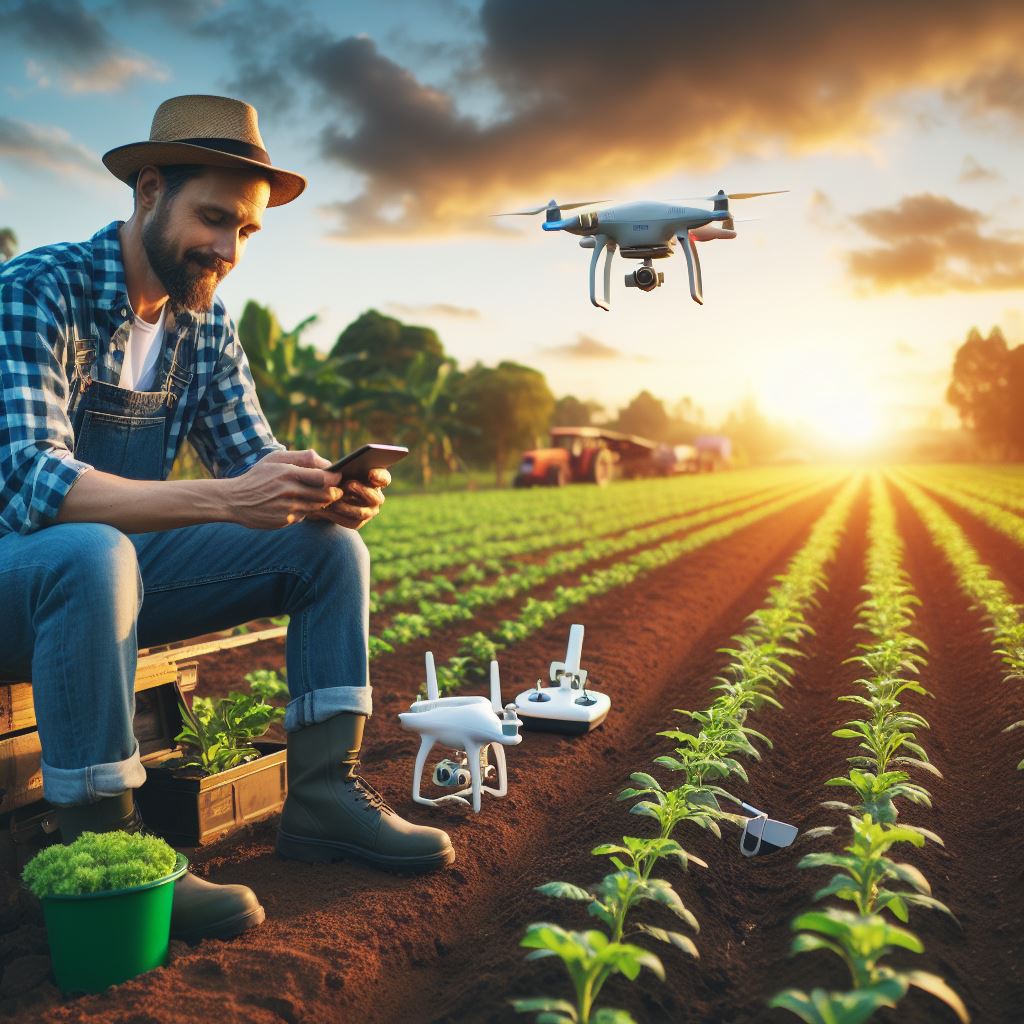Introduction
Let’s explore climate smart agriculture: Tech solutions.
Climate change poses significant threats to global food security, as extreme weather events and shifting climate patterns affect crop yields.
In this context, climate smart agriculture has emerged as a vital approach to address these challenges and ensure sustainable food production.
By integrating climate change considerations into farming practices, it aims to enhance productivity, build resilience, and reduce greenhouse gas emissions.
The use of technology has been instrumental in advancing climate smart agriculture.
Various tech solutions have been developed to optimize farming practices, minimize environmental impact, and improve food systems.
For instance, precision agriculture uses sensors, drones, and GPS to collect data on soil moisture, temperature, and crop growth rates.
This information helps farmers make informed decisions about irrigation, fertilization, and pest control, leading to optimized resource use and increased yields.
Another tech solution is the adoption of climate-resilient crops and livestock breeds.
Improved seed varieties and breeds are designed to withstand drought, pests, and diseases, ensuring better yield stability even under adverse conditions.
Additionally, the integration of renewable energy solutions like solar-powered irrigation systems reduces greenhouse gas emissions and enhances energy efficiency on farms.
Furthermore, digital platforms and mobile applications provide farmers with access to weather data, market information, and advisory services.
These tools empower farmers to make timely decisions, manage risks, and access wider markets, ultimately improving their livelihoods.
In short, climate smart agriculture and technology solutions are crucial for building a sustainable and resilient food system.
By harnessing the power of technology, farmers can adapt to climate change, improve productivity, and contribute to global efforts in mitigating climate impacts.
Transform Your Agribusiness
Unlock your farm's potential with expert advice tailored to your needs. Get actionable steps that drive real results.
Get StartedEmbracing these innovations will be key to ensuring food security for future generations.
Defining climate smart agriculture
Explanation of climate smart practices
Climate smart agriculture refers to the use of innovative technologies and practices that help farmers adapt to and mitigate the impacts of climate change on their land and crops.
These practices aim to increase agricultural productivity, enhance resilience, and reduce greenhouse gas emissions.
Sustainable land management techniques
One key aspect of climate smart agriculture is sustainable land management.
This involves practices like contour plowing, terracing, and agroforestry, which help prevent soil erosion, improve water retention, promote biodiversity, and enhance carbon sequestration.
Precision farming methods
Precision farming is another essential practice in climate smart agriculture.
It involves using technologies like GPS, remote sensing, and data analytics to optimize the use of inputs such as water, fertilizers, and pesticides.
This reduces waste and saves resources, resulting in higher crop yields and lower environmental impact.
Diversification of crops and livestock
Another climate smart practice is the diversification of crops and livestock.
By growing a variety of crops and breeding resilient livestock breeds, farmers can mitigate the risks associated with climate change.
This approach decreases vulnerability to pests, diseases, and extreme weather events while increasing food security.
Benefits of climate smart agriculture
Implementing climate smart agriculture practices can bring numerous benefits for farmers, the environment, and society as a whole.
Increased agricultural productivity and resilience
Climate smart practices help farmers adapt to changing climatic conditions, allowing them to maintain or increase their agricultural productivity.
Techniques like sustainable land management and precision farming ensure efficient resource utilization and reduce crop losses from extreme weather events.
Enhanced livelihoods for farmers
By adopting climate smart practices, farmers can enhance their income and livelihoods.
Higher crop yields and better resource management contribute to improved economic stability and food security for farming communities.
Environmental sustainability and biodiversity conservation
Climate smart agriculture promotes sustainable land use, soil health, and water management.
It reduces greenhouse gas emissions, preserves biodiversity, and safeguards natural resources for future generations.
Climate change mitigation
The adoption of climate smart practices contributes to global efforts in mitigating climate change.
By reducing greenhouse gas emissions, conserving forests, and enhancing carbon sequestration in soils, climate smart agriculture helps combat climate change and its adverse effects.
Resilient food systems
In the face of climate change, building resilient food systems is crucial.
Climate smart agriculture plays a vital role in ensuring food security by adapting farming practices to changing climate patterns and reducing vulnerability to climate-related risks.
In fact, climate smart agriculture encompasses a range of innovative practices that aim to help farmers adapt to and mitigate the impacts of climate change.
By implementing sustainable land management techniques, precision farming methods, and diversifying crops and livestock, farmers can increase productivity, enhance resilience, and reduce greenhouse gas emissions.
Showcase Your Farming Business
Publish your professional farming services profile on our blog for a one-time fee of $200 and reach a dedicated audience of farmers and agribusiness owners.
Publish Your ProfileThe benefits of climate smart agriculture extend beyond individual farmers, contributing to environmental sustainability, climate change mitigation, and resilient food systems for a better future.
Read: Hydroponics: High-Tech Farming Simplified
Technological advancements in climate smart agriculture
Technological advancements have revolutionized the agricultural sector, making it more efficient and sustainable than ever before.
Precision farming techniques
Precision farming techniques play a crucial role in climate smart agriculture. Drones are used for monitoring crops, providing real-time data on plant health and growth.
This enables farmers to take proactive measures to prevent diseases and optimize crop yield.
Additionally, GPS-guided equipment ensures precise planting, minimizing wasted resources and maximizing productivity.
Smart irrigation systems
Smart irrigation systems have also made a significant impact. Sensor-based technology allows for the measurement of soil moisture levels, ensuring efficient water usage and preventing overwatering.
Automated irrigation scheduling takes into account weather conditions and crop needs, reducing water waste and promoting water conservation.
Data analytics and AI in agriculture
The integration of data analytics and AI in agriculture has further enhanced the efficiency of farming practices.
By analyzing weather conditions, farmers can determine optimal planting times, reducing the risk of crop failure due to extreme weather events.
Predictive modeling helps in pest management, enabling farmers to take preventive measures and minimize the use of harmful pesticides.
Biotechnology and genetic engineering
Biotechnology and genetic engineering have also made remarkable contributions to climate smart agriculture.
Scientists have developed climate-resistant crop varieties that can withstand drought, floods, and other extreme weather conditions.
These crops are bred to have increased tolerance to pests and diseases, reducing the need for chemical interventions.
Genetic engineering techniques have also been used to enhance crop productivity and efficiency, resulting in higher yields and reduced resource consumption.
These technological advancements are not only beneficial for farmers but also for the environment.
Precision farming techniques, smart irrigation systems, data analytics, and biotechnology all contribute to reducing resource wastage, minimizing the environmental impact of agriculture, and promoting sustainability.
In essence, the use of technology in climate smart agriculture has revolutionized farming practices.
Precision farming techniques, smart irrigation systems, data analytics, and biotechnology have all played a significant role in making agriculture more efficient, productive, and sustainable.
By embracing these technological advancements, we can ensure food security while preserving the health of our planet.
Read: Smart Soil Sensors: Boosting Crop Yields
Case studies of successful implementation
Examples of climate smart technology adoption
The adoption of climate smart technologies has proven to be successful in various case studies.
Here, we will explore some examples of how these technologies are being implemented and the positive impacts they have on agriculture.
- Precision agriculture: Precision agriculture uses advanced technologies such as sensors, drones, and GPS to optimize resource allocation on farms. By precisely measuring soil moisture levels, nutrient needs, and pest populations, farmers can make informed decisions about irrigation, fertilization, and pesticide use. This leads to more efficient resource management, reduced input costs, and increased yields.
- Weather forecasting and monitoring: Accurate weather forecasting and monitoring systems help farmers to anticipate and prepare for extreme weather events. By receiving timely alerts, farmers can take preventive measures such as adjusting irrigation schedules or protecting crops from hailstorms or frost. This technology minimizes yield losses, reduces resource wastage, and promotes overall crop productivity.
- Smart pest management: Integrated Pest Management (IPM) techniques, aided by technology, are being widely adopted for efficient pest control. This approach involves monitoring pest populations, using natural predators, and implementing targeted chemical interventions when necessary. By minimizing pesticide use and optimizing pest control practices, farmers can protect their crops, reduce environmental contamination, and ensure long-term profitability.
Positive impacts on crop yield, resource management, and profitability
The adoption of climate smart technologies has shown significant positive impacts on crop yield, resource management, and profitability for farmers.
- Improved crop yields: Climate smart technologies enable farmers to optimize inputs and maximize yield potential. By using precision agriculture techniques, farmers can apply the right amount of water, nutrients, and pesticides at the right time and in the right location. This results in healthier plants, reduced crop stress, and increased yields.
- Efficient resource management: Climate smart technologies help farmers make informed decisions about resource allocation. By monitoring soil moisture levels, farmers can avoid irrigation overuse and reduce water wastage. Similarly, by using sensor technology, farmers can identify areas of the field with nutrient deficiencies and target fertilizer application, minimizing their use and maximizing nutrient uptake.
- Increased profitability: Climate smart technologies contribute to improved profitability for farmers. By optimizing resource use and reducing input costs, farmers can achieve higher returns on their investment. Additionally, improved crop yields and quality lead to higher market value and increased market opportunities, enhancing farm profitability.
In general, the adoption of climate smart technologies in agriculture has shown great promise in increasing productivity, optimizing resource management, and promoting profitability.
Case studies have demonstrated successful implementation of precision agriculture, weather forecasting, smart pest management, and other technology-driven approaches.
By harnessing these tools, farmers can mitigate the impacts of climate change, ensure sustainable agriculture, and meet the growing demand for food in a changing world.
Read: Robotic Farm Hands: The New Agri Trend

Challenges and Limitations
Cost and Accessibility Issues
Inadequate funding and limited access to technology hinder the widespread adoption of climate smart agriculture.
Small-scale farmers, especially, face financial challenges in implementing these solutions due to their high costs.
Additionally, remote and rural areas often lack the necessary infrastructure to support the accessibility of these technologies.
Lack of Awareness and Knowledge
Farmers’ lack of awareness about climate smart agriculture and limited knowledge about available technology solutions further contribute to the challenges.
Many farmers remain unaware of the potential benefits these technologies offer in dealing with the impacts of climate change.
Providing training and capacity building programs can help address this issue and empower farmers to make informed decisions about adopting relevant tech solutions.
Potential Environmental and Ethical Concerns
Furthermore, there are potential environmental and ethical concerns associated with certain technology solutions.
Some technologies may unintentionally harm the environment or contribute to negative impacts such as deforestation.
The use of GMOs in some solutions can raise ethical concerns. It is crucial to ensure that the implementation of these technologies does not compromise biodiversity or result in unintended negative consequences.
Establishing monitoring mechanisms and regulations can help mitigate these concerns and promote responsible use of technology in agriculture.
Overall, addressing the challenges and limitations of climate smart agriculture requires a multi-faceted approach.
Governments, NGOs, and relevant stakeholders should work together to make technology solutions more affordable and accessible.
Showcase Your Farming Business
Publish your professional farming services profile on our blog for a one-time fee of $200 and reach a dedicated audience of farmers and agribusiness owners.
Publish Your ProfileAwareness campaigns and training programs can help educate farmers about these technologies, enabling them to make informed decisions.
Moreover, continuous monitoring and adequate regulations are essential to ensure environmental sustainability and ethical considerations are taken into account.
By tackling these challenges, we can harness the full potential of technology in building a resilient and sustainable agricultural sector.
Read: Drone Tech in Agriculture: A Game Changer
Future prospects and potential advancements
Climate smart agriculture holds immense potential for the future, with the integration of advanced technologies and collaborative efforts.
Emerging technologies in climate smart agriculture
Emerging technologies like precision agriculture and remote sensing enable farmers to make data-driven decisions, resulting in optimized resource allocation and increased yields.
The use of drones for targeted spraying minimizes the environmental impact of fertilizers and pesticides.
Collaborative efforts and research initiatives
Collaborative efforts and research initiatives play a crucial role in driving innovation in climate smart agriculture.
Partnerships between governments, research institutions, and private sectors foster knowledge sharing and the development of new solutions.
Funding support for research projects and the promotion of collaboration platforms further accelerate advancements in the field.
Integration of renewable energy solutions in farming practice
In addition, the integration of renewable energy solutions in farming practices contributes to sustainable agriculture.
Solar panels and wind turbines generate clean energy, reducing reliance on fossil fuels.
Bioenergy technologies like biogas production from farm waste provide eco-friendly alternatives for heating and electricity.
By adopting energy-efficient irrigation systems and exploring agroforestry practices, farmers can minimize their carbon footprint and contribute to climate change mitigation.
Furthermore, innovative approaches such as vertical farming and hydroponics offer exciting prospects for the future.
These practices, which require less land and water resources, can be implemented in urban environments or areas with limited arable land.
They offer increased control over growing conditions and optimize resource utilization, making them ideal for climate smart agriculture.
In a nutshell, the future of climate smart agriculture looks promising.
Through the integration of emerging technologies, collaborative efforts, and renewable energy solutions, farmers can enhance their productivity while mitigating the environmental impacts of traditional farming practices.
Continued research and investment in this field will lead to further advancements and ensure sustainable food production in the face of a changing climate.
Explore Further: Vertical Farming: Agri-Tech’s Rising Star
Conclusion
Climate smart agriculture and tech solutions play a crucial role in ensuring sustainable food production and mitigating the impacts of climate change.
These technologies provide innovative ways to address challenges faced by farmers and contribute to the overall resilience of agricultural systems.
By integrating climate smart agriculture practices, such as precision farming, smart irrigation systems, and weather monitoring tools, farmers can optimize resource use, reduce greenhouse gas emissions, and enhance productivity.
Furthermore, the adoption of tech solutions in agriculture can improve data collection and analysis, provide real-time information, and facilitate better decision-making.
This empowers farmers to adapt to changing climatic conditions, manage risks, and increase their resilience to climate-related challenges.
It is essential for policymakers, governments, and stakeholders to support the adoption of these technologies, provide necessary infrastructure and resources, and promote knowledge sharing and capacity building.
Investing in research and development of climate smart agriculture and tech solutions can result in long-term benefits for the agricultural sector and the environment.
Moreover, embracing these technologies can help achieve the Sustainable Development Goals, particularly in eradicating hunger, promoting sustainable agriculture, and combating climate change.
Climate smart agriculture and tech solutions are not only crucial for the future of agriculture but also offer immense potential for sustainable development and the well-being of farmers and the planet.
Let us join hands and work towards a climate-resilient and technologically advanced agricultural system for a better future.




